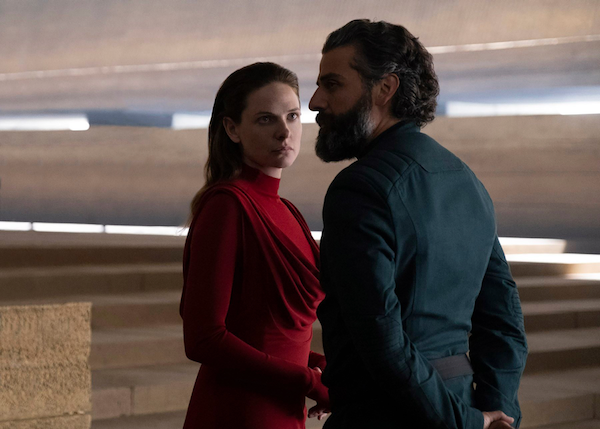Movie review by Greg Carlson
The many media attempts at Frank Herbert’s epic space fantasy “Dune” speak to its lasting appeal and its potent impact. David Lynch’s movie, defended by the filmmaker’s most ardent supporters but excoriated by a larger chorus disappointed in the heavy hand applied by House De Laurentiis, marked the end of a lengthy journey to the screen that defeated the likes of Alejandro Jodorowsky and Ridley Scott along the way. Dreams of what might have been — Orson Welles as Baron Harkonnen! Moebius and H. R. Giger design! — gave way to the realities of any “faithful” adaptation. At its best, Herbert’s book presents a stunning vision of political power, ecological and environmental awareness, ruling-class genealogy, military conflict, and thrilling mysticism and religious mythmaking filtered through a messianic hero’s journey.
At its weakest, “Dune” has too many scenes of people standing around and talking.
Denis Villeneuve’s “Dune: Part One” is a worthy addition to the collection, besting the Lynch in certain ways but still flummoxed and frustrated by the source material’s conversation-heavy downside. Villeneuve is clearly a fan, a Bene Gesserit-level adherent to the Weirding Way and a desert mouse who respects the Shai-Hulud. The director’s impressive track record with dazzling ideas and/or imagery in settings both smaller (“Prisoners,” “Enemy”) and grander (“Arrival,” “Blade Runner 2049”) raised expectations higher than a Guild Navigator on uncut spice. The filmmaker delivers at least 450 meters of world-building eye candy to remind everyone of Herbert’s far-reaching influence.
Villeneuve juggles a huge cast filled with famous and should-be famous performers well-suited to flesh out their occasionally flat literary antecedents. Some great faces made up Lynch’s roster, including many favorites in the filmmaker’s stock company, and Villeneuve could not ask for more capable portrayers in nearly all the principal and supporting roles. Rebecca Ferguson as Jessica and Oscar Isaac as Duke Leto Atreides, despite sharing few one-on-one scenes, walk off with the movie. While Lynch’s screenplay diminished and truncated Jurgen Prochnow’s Leto, Villeneuve concentrates the time and attention required to express the Shakespearean tragedy of the Red Duke and articulate the emotional connection between Leto and his son.
Perhaps Jodorowsky was on to something when he argued for a ten to fourteen-hour running time. If all goes according to plan, “Dune: Part Two” will remedy the insufficient, almost fleeting presence of Zendaya’s Chani, Javier Bardem’s Stilgar, and even Dave Bautista’s Beast Rabban. There’s no question that Villeneuve’s decision to divide the book leaves both newcomers and the “Dune” faithful with lots of questions and the empty feelings that go along with unfinished business. My friend Aaron Anderson is spot-on with his note that the second section should have been filmed at the same time and prepared for a 2022 release.
Villeneuve’s “Dune” takes itself so seriously that plenty of observers have dipped their Gom Jabbar needles into poisoned inkwells. David Ehrlich’s vicious takedown is entertainingly arch, slightly cruel, and not entirely fair. Peter Opaskar’s wild, tongue-in-cheek defense of Lynch’s version as the greatest film ever made — one of several recent reassessments of the 1984 movie — was posted before Opaskar watched the new one. I am glad to live in a world where we already have two big screen interpretations and Frank Pavitch’s fantastic documentary. If we don’t destroy ourselves, there will surely be enough “Dune” by the year 10,191 to please everybody.
